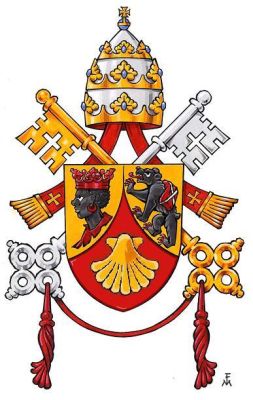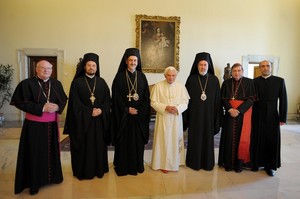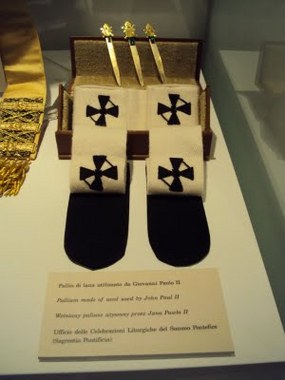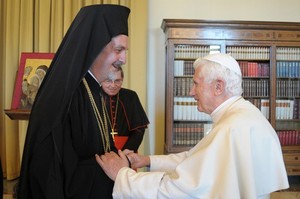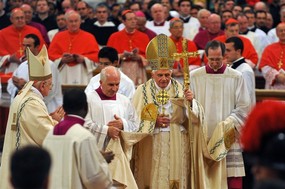From the point of view of truth, Ed Stannard’s article in today’s New Haven Register, “New Haven Church to Fill Spiritual Void” is a bit misleading when he fails to distinguish between the Church –meaning the Catholic Church– and the various ecclesial communities such as the Protestant types. He reduces the truth of being one, holy, catholic and apostolic, i.e., being authentically Catholic– to being opportunistic. No doubt there are opportunities for evangelization that the Catholics are unable to engage in now, but the presence of the Catholic remains solidly in New Haven and can never be replaced by a denomination, which the Catholics are not.
Category: Ecumenism
Rowan Williams set to quit?
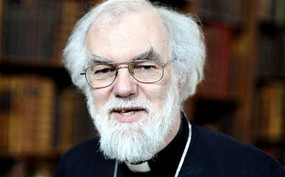 Lots of speculation floating around these days about the retirement of the Archbishop of Canterbury, Rowan Williams. If it happens, it’s expected after the Diamond Jubliee of Her Majesty, the Queen. Jonathan Wynne-Jones of London’s The Telegraph has an article, “Archbishop of Canterbury Dr Rowan Williams set to quite next year.” Say it ain’t so. I like Dr Williams, and I would be sad to see him leave the See of Canterbury. But may be if does, he can swim the Tiber, too.
Lots of speculation floating around these days about the retirement of the Archbishop of Canterbury, Rowan Williams. If it happens, it’s expected after the Diamond Jubliee of Her Majesty, the Queen. Jonathan Wynne-Jones of London’s The Telegraph has an article, “Archbishop of Canterbury Dr Rowan Williams set to quite next year.” Say it ain’t so. I like Dr Williams, and I would be sad to see him leave the See of Canterbury. But may be if does, he can swim the Tiber, too.
“Ecumenism Is To Be Revived and Promoted” says Mansueto Bianchi
Luca Rolandi ppublished an article on the Vatican Insider “Ecumenism Is To Be Revived and Promomoted” taking his cue from the Italian bishop and president of the CEI commission on Ecumenism and Interreligious Dialogue who spoke at a recent ecumenical event on Spirituality at the Monastery of Bose.
Saints Peter and Paul: “I no longer call you servants, but friends”
The Church celebrates today great solemn feast of Saints Peter and Paul, it is also the 60th anniversary of Pope Benedict’s priestly ordination as well as the day the See of Constantinople sends a delegation to Rome to pray at the tombs of the two great saints and to meet with the Pope. Plus, it is the day in which the metropolitan archbishops who have been appointed in the last calendar year come to Rome to receive the palium (see below). The USA has for archbishops receiving their pallium today: San Antonio, Oklahoma City, Seattle and Los Angelos. All four of these archbishops are under 60. Watch the video clip.
“Non iam dicam servos, sed amicos” – “I no longer call you servants, but friends” (cf. Jn 15:15).
Sixty years on from the day of my priestly ordination, I hear once again deep within me these words of Jesus that were addressed to us new priests at the end of the ordination ceremony by the Archbishop, Cardinal Faulhaber, in his slightly frail yet firm voice. According to the liturgical practice of that time, these words conferred on the newly-ordained priests the authority to forgive sins. “No longer servants, but friends”: at that moment I knew deep down that these words were no mere formality, nor were they simply a quotation from Scripture. I knew that, at that moment, the Lord himself was speaking to me in a very personal way. In baptism and confirmation he had already drawn us close to him, he had already received us into God’s family. But what was taking place now was something greater still. He calls me his friend. He welcomes me into the circle of those he had spoken to in the Upper Room, into the circle of those whom he knows in a very special way, and who thereby come to know him in a very special way. He grants me the almost frightening faculty to do what only he, the Son of God, can legitimately say and do: I forgive you your sins. He wants me – with his authority – to be able to speak, in his name (“I” forgive), words that are not merely words, but an action, changing something at the deepest level of being. I know that behind these words lies his suffering for us and on account of us. I know that forgiveness comes at a price: in his Passion he went deep down into the sordid darkness of our sins. He went down into the night of our guilt, for only thus can it be transformed. And by giving me authority to forgive sins, he lets me look down into the abyss of man, into the immensity of his suffering for us men, and this enables me to sense the immensity of his love. He confides in me: “No longer servants, but friends”. He entrusts to me the words of consecration in the Eucharist. He trusts me to proclaim his word, to explain it aright and to bring it to the people of today. He entrusts himself to me. “You are no longer servants, but friends”: these words bring great inner joy, but at the same time, they are so awe-inspiring that one can feel daunted as the decades go by amid so many experiences of one’s own frailty and his inexhaustible goodness.
“No longer servants, but friends”: this saying contains within itself the entire programme of a priestly life. What is friendship? Idem velle, idem nolle – wanting the same things, rejecting the same things: this was how it was expressed in antiquity. Friendship is a communion of thinking and willing. The Lord says the same thing to us most insistently: “I know my own and my own know me” (Jn 10:14). The Shepherd calls his own by name (cf. Jn 10:3). He knows me by name. I am not just some nameless being in the infinity of the universe. He knows me personally. Do I know him? The friendship that he bestows upon me can only mean that I too try to know him better; that in the Scriptures, in the Sacraments, in prayer, in the communion of saints, in the people who come to me, sent by him, I try to come to know the Lord himself more and more. Friendship is not just about knowing someone, it is above all a communion of the will. It means that my will grows into ever greater conformity with his will. For his will is not something external and foreign to me, something to which I more or less willingly submit or else refuse to submit. No, in friendship, my will grows together with his will, and his will becomes mine: this is how I become truly myself. Over and above communion of thinking and willing, the Lord mentions a third, new element: he gives his life for us (cf. Jn 15:13; 10:15). Lord, help me to come to know you more and more. Help me to be ever more at one with your will. Help me to live my life not for myself, but in union with you to live it for others. Help me to become ever more your friend.
Jesus’ words on friendship should be seen in the context of the discourse on the vine. The Lord associates the image of the vine with a commission to the disciples: “I appointed you that you should go out and bear fruit, and that your fruit should abide” (Jn 15:16). The first commission to the disciples, to his friends, is that of setting out – appointed to go out -, stepping outside oneself and towards others. Here we hear an echo of the words of the risen Lord to his disciples at the end of Matthew’s Gospel: “Go therefore and make disciples of all nations …” (cf. Mt 28:19f.) The Lord challenges us to move beyond the boundaries of our own world and to bring the Gospel to the world of others, so that it pervades everything and hence the world is opened up for God’s kingdom. We are reminded that even God stepped outside himself, he set his glory aside in order to seek us, in order to bring us his light and his love. We want to follow the God who sets out in this way, we want to move beyond the inertia of self-centredness, so that he himself can enter our world.
After the reference to setting out, Jesus continues: bear fruit, fruit that abides. What fruit does he expect from us? What is this fruit that abides? Now, the fruit of the vine is the grape, and it is from the grape that wine is made. Let us reflect for a moment on this image. For good grapes to ripen, sun is needed, but so too is rain, by day and by night. For noble wine to mature, the grapes need to be pressed, patience is needed while the juice ferments, watchful care is needed to assist the processes of maturation. Noble wine is marked not only by sweetness, but by rich and subtle flavours, the manifold aroma that develops during the processes of maturation and fermentation. Is this not already an image of human life, and especially of our lives as priests? We need both sun and rain, festivity and adversity, times of purification and testing, as well as times of joyful journeying with the Gospel. In hindsight we can thank God for both: for the challenges and the joys, for the dark times and the glad times. In both, we can recognize the constant presence of his love, which unfailingly supports and sustains us.
Yet now we must ask: what sort of fruit does the Lord expect from us? Wine is an image of love: this is the true fruit that abides, the fruit that God wants from us. But let us not forget that in the Old Testament the wine expected from noble grapes is above all an image of justice, which arises from a life lived in accordance with God’s law. And this is not to be dismissed as an Old Testament view that has been surpassed – no, it still remains true. The true content of the Law, its summa, is love for God and for one’s neighbour. But this twofold love is not simply saccharine. It bears within itself the precious cargo of patience, humility, and growth in the conforming of our will to God’s will, to the will of Jesus Christ, our friend. Only in this way, as the whole of our being takes on the qualities of truth and righteousness, is love also true, only thus is it ripe fruit. Its inner demand – faithfulness to Christ and to his Church —seeks a fulfilment that always includes suffering. This is the way that true joy grows. At a deep level, the essence of love, the essence of genuine fruit, coincides with the idea of setting out, going towards: it means self-abandonment, self-giving, it bears within itself the sign of the cross. Gregory the Great once said in this regard: if you are striving for God, take care not to go to him by yourselves alone — a saying that we priests need to keep before us every day (H Ev 1:6:6 PL 76, 1097f.).
Dear friends, perhaps I have dwelt for too long on my inner recollections of sixty years of priestly ministry. Now it is time to turn our attention to the particular task that is to be performed today.
On the feast of Saints Peter and Paul my most cordial greeting goes first of all to the Ecumenical Patriarch Bartholomaios I and to the Delegation he has sent, to whom I express sincere thanks for their most welcome visit on the happy occasion of this feast of the holy Apostles who are Rome’s patrons. I also greet the Cardinals, my brother bishops, the ambassadors and civil authorities as well as the priests, the confrères of my first Mass, religious and lay faithful. I thank all of you for your presence and your prayers.
The metropolitan archbishops appointed since the feast of Saints Peter and Paul last year are now going to receive the pallium. What does this mean? It may remind us in the first instance of Christ’s easy yoke that is laid upon us (cf. Mt 11:29f.). Christ’s yoke is identical with his friendship. It is a yoke of friendship and therefore “a sweet yoke”, but as such it is also a demanding yoke, one that forms us. It is the yoke of his will, which is a will of truth and love. For us, then, it is first and foremost the yoke of leading others to friendship with Christ and being available to others, caring for them as shepherds. This brings us to a further meaning of the pallium: it is woven from the wool of lambs blessed on the feast of Saint Agnes. Thus it reminds us of the Shepherd who himself became a lamb, out of love for us. It reminds us of Christ, who set out through the mountains and the deserts, in which his lamb, humanity, had strayed. It reminds us of him who took the lamb – humanity – me – upon his shoulders, in order to carry me home. It thus reminds us that we too, as shepherds in his service, are to carry others with us, taking them as it were upon our shoulders and bringing them to Christ. It reminds us that we are called to be shepherds of his flock, which always remains his and does not become ours. Finally the pallium also means quite concretely the communion of the shepherds of the Church with Peter and with his successors – it means that we must be shepherds for unity and in unity, and that it is only in the unity represented by Peter that we truly lead people to Christ.
Sixty years of priestly ministry – dear friends, perhaps I have spoken for too long about this. But I felt prompted at this moment to look back upon the things that have left their mark on the last six decades. I felt prompted to address to you, to all priests and bishops and to the faithful of the Church, a word of hope and encouragement; a word that has matured in long experience of how good the Lord is. Above all, though, it is a time of thanksgiving: thanks to the Lord for the friendship that he has bestowed upon me and that he wishes to bestow upon us all. Thanks to the people who have formed and accompanied me. And all this includes the prayer that the Lord will one day welcome us in his goodness and invite us to contemplate his joy. Amen.
Reciprocal festal gestures for Sts Peter & Paul feast: Pope and an Ecumenical delegation meet
It’s like having your favorite but not too seen aunt Gretchen over the house for coffee to remember what she looks like and to keep up some appearances of genuine love. I shouldn’t make light of such encounters; they are important. It’s tradition and tradition is a very good thing. On the feast of Saints Peter and Paul a delegation is sent to Rome to meet the Pope, to exchange fraternal greetings, to listen to a brief discourse that’s on the mind of the Pope, to hear what the Patriarch of Constantinople has to say, etc. The whole thing is repeated on November 30 when Rome sends a delegation to Constantinople for the feast of Saint Andrew. The trouble is, does anything concrete result from these yearly meetings? What are the implications of this type of high level meeting? Note the Pope’s perspective and his hope. There is an important rhythm of dialogue that happens in coming to understand human and ecclesial complexities which have an end in mind. Two of the Pope’s paragraphs are noted below.
The Orthodox delegation included: His Eminence, Emmanuel, metropolitan of France and Director of the Office of the Orthodox Church to the European Union, Bishop Athenagoras, Bishop of Sinope and auxiliary to the metropolitan of Belgium and Archimandrite Maximus Pothos, vicar general of the metropolitan of Switerland.
Watch the video report from H2O News.
We follow with great attention the work of the Mixed Commission for Theological Dialogue between the Catholic Church and the Orthodox Church as a whole. From a purely human point of view, one might have the impression that the theological dialogue is having trouble in progressing. In reality, the rhythm of dialogue is linked to the complexity of the themes being discussed, which call for an extraordinary effort of study, of reflection and of reciprocal openness. We are called to continue this course together in charity, invoking light and inspiration from the Holy Spirit, in the certainty that He wishes to lead us to the full accomplishment of the will of Christ: that they may all be one (John 17:21). I am particularly grateful to all the members of the Mixed Commission and in particular to the co-Presidents, His Eminence the Metropolitan of Pergamum Ioannis and His Eminence Cardinal Kurt Koch, for their tireless dedication, their patience and their competence.
Christianity is not a community closed-in on itself, Pope tells us about Unity among Christians
The Pope’s homily for Vespers at the Basilica of Saint Paul’s Outside the Walls for the feast of the Conversion of Saint Paul and the closing of Week of Prayer for Christian Unity. A video clip of the event.
Following the
example of Jesus, who on the eve of his Passion prayed to the Father for his
disciples “that they may all be one” (John 17:21), Christians
continue to invoke incessantly from God the gift of this unity. This request is
made more intense during the Week of Prayer, which ends today, when the
Churches and ecclesial Communities meditate and pray together for the unity of
all Christians.
This year the theme offered for our meditation was proposed by
the Christian communities of Jerusalem, to which I would like to express by heartfelt
gratitude, accompanied by the assurance of affection and prayer either on my
part or on that of the whole of the Church. The Christians of the Holy City
invite us to renew and
Opportunities for continuing dialogue with the Orthodox Church, Farrell says
In the middle of
the annual exercise of prayer and
study for Christian Unity, the Vatican’s daily news paper, L’Osservatore Romano,
interviewed Bishop Brian Farrell, LC, secretary of the Pontifical Council for
Promoting Christian Unity. The interviewer asked Bishop Farrell about problems
in the ecumenical quest with the Orthodox Church, and his answer is below.
We
are examining the crucial point of our differences on the Church’s structure
and way of being and operating: the question of the role of the Bishop of Rome
in the Church communion of the first millennium, when the Church in the West
and East was still united. After profound studies and discussions, the members
of the Theological Commission have come to realize the enormous difference
between the lived, assimilated, and narrated historical experience in Western
culture and the historical experience perceived in the Eastern vision of
things. Every historical event is open to different interpretations. The
discussion has not led to a real convergence.
Continue reading Opportunities for continuing dialogue with the Orthodox Church, Farrell says
Pope talks about Christian Unity this week
This week the Christian Churches around the world are observing the Week of Prayer for Christian Unity. Today, the Pope gave his thoughts on the subject:
1. “we have listening to the teaching of the Apostles, or
listening to the witness that they give to the mission, life, death and
resurrection of the Lord Jesus. It is what Paul simply calls the Gospel”.
“Even today, the community of believers recognizes in reference to the
teaching of the Apostles the law for their faith; every effort to build unity
among all Christians therefore passes through the deepening of fidelity to the
deposit of faith handed down to us by the apostles.”
Praying the Christian Unity
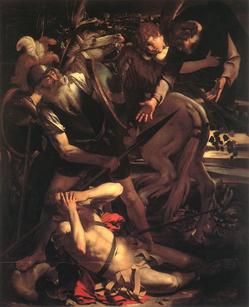 The theme chosen for 2011s Week of Prayer for Christian
The theme chosen for 2011s Week of Prayer for Christian
Unity is: “One in the apostles’ teaching, fellowship, breaking of bread
and prayer” (cf. Acts 2:42). The week of prayer was collaboratively
prepared by members of the Pontifical Council for Promoting Christian Unity and
the Commission on Faith and Order of the World Council of Churches.
January: Devotion to the Apostles’ Teaching Unites Us
Expression of Our Unity
Empowered to Action in Prayer
January: Called for the Service of Reconciliation.
by Benedict XVI held at the Basilica of Saint Paul’s outside-the-Walls at 5.30
pm (Rome time) on Tuesday, 25 January, Feast of the Conversion of the Apostle
Paul. Various delegations of ecumenical guests will be present for Vespers.
Tarcisio Bertone’s homily for the feast of St Andrew at the Orthodox Cathedral of the Assumption of Astana, Kazakhstan
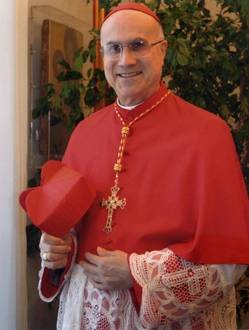 I am happy to be in Astana, capital of the Republic of Kazakhstan, this noble and vast country located in the heart of the Eurasian territory. I wish to express my profound joy at being able to visit your Cathedral of the Assumption, recently opened for worship. I greet everyone with affection, beginning with His Eminence Metropolitan Alexander and, while I thank him for his fraternal reception, I bring to him and to all of you the cordial greeting of the Holy Father Benedict XVI, praying that it be transmitted to His Holiness Kirill, patriarch of Moscow and All Russias. I then greet the other religious (and civil) authorities, the priests, deacons and faithful of the Orthodox Church of Kazakhstan. May this fraternal meeting of ours inspire a renewed impetus to join forces, so that in a not distant future we, the disciples of Christ, can proclaim with one voice and one heart the Gospel, message of hope for the whole of humanity.
I am happy to be in Astana, capital of the Republic of Kazakhstan, this noble and vast country located in the heart of the Eurasian territory. I wish to express my profound joy at being able to visit your Cathedral of the Assumption, recently opened for worship. I greet everyone with affection, beginning with His Eminence Metropolitan Alexander and, while I thank him for his fraternal reception, I bring to him and to all of you the cordial greeting of the Holy Father Benedict XVI, praying that it be transmitted to His Holiness Kirill, patriarch of Moscow and All Russias. I then greet the other religious (and civil) authorities, the priests, deacons and faithful of the Orthodox Church of Kazakhstan. May this fraternal meeting of ours inspire a renewed impetus to join forces, so that in a not distant future we, the disciples of Christ, can proclaim with one voice and one heart the Gospel, message of hope for the whole of humanity.
The occasion of this agreeable visit to Astana is the summit of heads of state and government of countries of the Organization for Security and Cooperation in Europe (OSCE), which will take place in the next few days. This circumstance suggested to the highest authorities of Kazakhstan to address to me a cordial invitation to visit your land. In willingly receiving this deferent and appreciated gesture, I immediately thought of the joy of being able to go to a country in which there are ample possibilities for a peaceful and profitable religious coexistence. In this context, for us Christians the duty of reciprocal love is all the more urgent: we are called, in fact, to give witness to all, with words and works, that God is Love. In this connection, my presence also intends to be an encouragement to continue on the way of great respect and affection, which I know exists between the Orthodox and Catholic communities of Astana, as well as of other cities. Propitious occasions are not lacking, dear friends, of mutual support and of deepening of friendship.
Today, in this welcome meeting with you, I have the special joy of fulfilling the lofty task entrusted to me by the Holy Father Benedict XVI, of handing you a fragment of the distinguished relics of the Apostle St. Andrew, which are venerated in Italy, in the city of Amalfi. This assignment, which I am honored to effect in the hands of His Eminence Metropolitan Alexander, comes in response to the devout request that his predecessor, Metropolitan Mefodji, and Archbishop Tomash Peta, Catholic Metropolitan, jointly addressed to Pope Benedict XVI. The Pontiff, gladly desiring to meet the ardent request, decided to send to the two respective Churches two fragments of the precious relics. This choice has a profound significance, in as much as is underlines the common veneration of the Apostles.
I am happy to stress that today’s event of handing the relic of St. Andrew, who you venerate, coincides in fact with the day in which, according to the calendar of the Latin Church, his liturgical feast is celebrated. Andrew was born in Bethsaida, at first he was a disciple of John the Baptist and then he followed the Lord Jesus, to whom he also led his brother Peter. Together with Philip he presented Christ himself to the Gentiles and pointed out the boy who carried the fish and the loaves. According to tradition, after Pentecost, he preached in different areas and was crucified in Achaia, Greece. The Gospel narrates that Jesus, “passing along by the Sea of Galilee, saw Simon and Andrew the brother of Simon casting a net in the sea; for they were fishermen. And Jesus said to them, ‘Follow me and I will make you fishers of men'” (Mark 1:16-17). Andrew, hence, was the first of the Apostles to be called to follow Jesus. Precisely on the basis of this fact, the Byzantine liturgy honors him with the name of Protoklitos, which means precisely, the first called.
The evangelical account continues specifying that “immediately they left their nets and followed him” (Mark 1:18). It is this quick adherence that allowed the Apostles to spread the Word, the “good news” of salvation. Faith comes from listening, and what is heard is the Word of Christ, which still today the Church spreads to the ends of the earth. This Word is the indispensable food of the soul. It is said in the book of the prophet Amos that God will put hunger in the world, not hunger for bread, but to hear his word (cf. Amos 8:11). This is a healthy hunger, because it makes us seek constantly and receive the Word of God, knowing that it must nourish us for the whole of life. Nothing in life can have consistency, nothing can really satisfy us if it is not nourished, penetrated, illumined, guided by the Word of the Lord. Moreover, an ever more profound commitment of radical adherence to this Word, together with the support of the Holy Spirit, constitute the strength to realize the aspiration of every Christian community and of every individual faithful to unity (cf. Benedict XVI, Apostolic Exhortation Verbum Domini, No. 46).
From the Gospel of St. John, we gather another important particular regarding the Apostle Andrew: “He first found his brother Simon, and said to him, ‘We have found the Messiah’ (which means Christ. He brought him to Jesus” (John 1:41-43), demonstrating immediately an unmistakable apostolic spirit. To this end, St. John Chrysostom comments: “Andrew’s word is the word of one who anxiously awaited the coming of the Messiah, whose descent from heaven he awaited, who trembled with joy when he saw him arrive, and who hurried to communicate the great news to the others. See in what way he notifies what he had appreciated in a short time? Andrew, after having stayed with Jesus and having learned everything that Jesus taught him, did not keep the treasure to himself, but hurried to his brother to communicate to him the richness he had received. Look also at Peter’s spirit, from the beginning docile and quick in faith: he runs immediately without being concerned about anything else” (Homily 19, 1; PG 59, 120).
In the beautiful icon donated by Patriarch Athenagoras I to Pope Paul VI on Jan. 5, 1964, the two Holy Apostles, Peter the Coryphaeus and Andrew the Protoklitos, embrace, in an eloquent language of love, beneath the glorious Christ. Andrew was the first to follow the Lord, Peter was called to confirm his brothers in the faith. Their embrace under the gaze of Christ is an invitation to continue the path undertaken, toward that goal of unity that we intend to reach together. Nothing must discourage us, but we must go forward with hope, supported by the intercession of the Apostles Peter and Andrew, as well as by the maternal protection of Mary Most Holy, Mother of Christ and our Mother. Let us ask God with particular intensity for the precious gift of unity among all Christians, making our own the invocation that Jesus raised to the Father for his disciples: “that they may all be one; even as thou, Father, art in me, and I in thee, that they also may be in us, so that the world may believe that thou hast sent me” (John 17:21).
